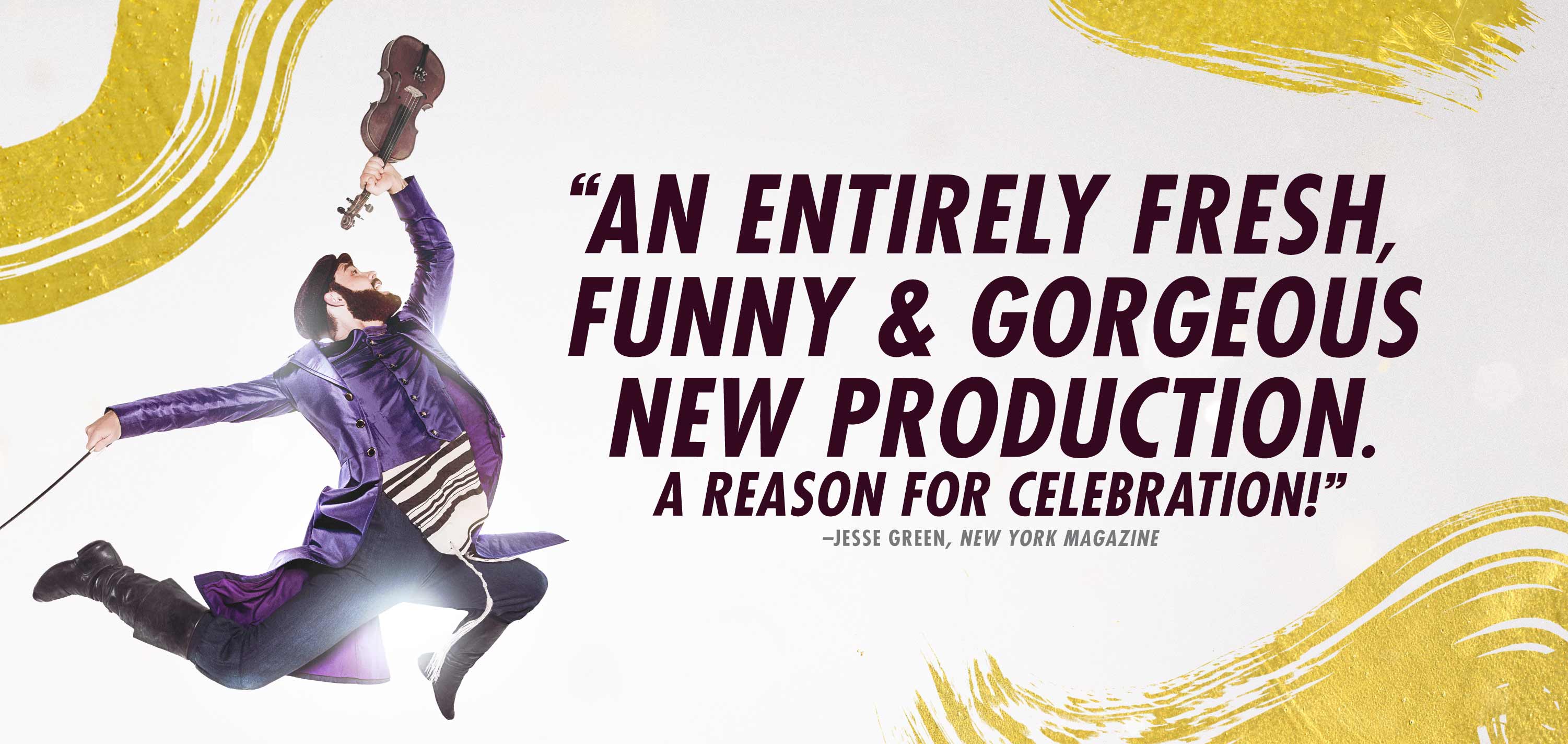

“Electrifying!”
- The New York Times
A Milkman Returns, Emotional as Ever
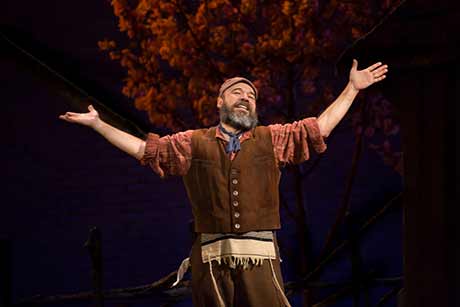
By Charles Isherwood
The sorry state of the world gives us new reason to appreciate the depth of feeling so powerfully, so ingeniously embedded in “Fiddler on the Roof,” the much-loved and much-revived 1964 musical comedy that has returned to Broadway at a time when its story of the gradual disintegration of a family, and a community, strikes home with unusual force.
The superb new production certainly honors the show’s ebullience of spirit, as embodied in the central character of the Jewish milkman Tevye, living in a Russian shtetl in the early 20th century, eternally wagging his tongue, shaking his fist and cracking wise at an indifferent God.
But as directed by Bartlett Sher with his customary sensitivity (“The King and I,” “South Pacific”), this multihued staging moves to a heart-stopping conclusion. It’s impossible to watch the people of Tevye’s town, Anatevka, marching toward their unknown destinies in the shadow of a threatened pogrom without thinking of the thousands of families fleeing violence in the Middle East and elsewhere today.
Oy! Enough philosophizing, as Tevye might say with a shrug. It’s just a musical, no? Yes, but what a musical. The score, by Jerry Bock (music) and Sheldon Harnick (lyrics), enters your bloodstream, indelibly, upon a single hearing, so rousing are its songs of celebration, so beautiful the melodies of its songs of love and loss — two sides, for Tevye, of the same coin. And Joseph Stein’s book miraculously blends borscht belt humor with a moving depiction of Tevye’s conflicted heart and the suffering of the Jews under Russian imperialism.
The role of Tevye is here undertaken by Danny Burstein, a five-time Tony nominee. Mr. Burstein unleashes his rich baritone with roof-raising force when Tevye’s emotion is at its height, bringing home the character’s indomitable will, often hidden beneath his self-deprecating humor and sorely tried by his rebellious daughters. Tevye’s wife, Golde, is played by Jessica Hecht. She brings a moving, careworn quality to her performance.
A framing device finds Mr. Burstein first standing on a bare stage, a contemporary figure in a red parka facing a monumental brick wall. A sign bearing the name Anatevka hangs over a bare expanse. He is, we assume, a descendant of one of the townspeople, coming to see what is left of the shtetl.
Mr. Burstein quickly unzips the parka to become Tevye, dressed traditionally, a prayer shawl hanging from underneath his vest. The famous violin solo is heard, and soon the stage has filled with the people of Anatevka singing the electrifying opening number, “Tradition,” which defines the central theme, the tension between honoring the past and accepting progress.
To read the full review, please click here.
“★ ★ ★ ★ ★ A Magnificent, Life-Affirming Production.”
- Time Out New York
Fiddler on the Roof: Theater Review
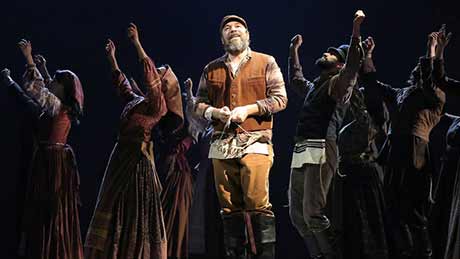
By David Cote
Although the titans Zero Mostel, Jerome Robbins and Harold Prince are reflexively linked to this 1964 classic, there’s another, uncredited, father of Fiddler on the Roof. It’s Marc Chagall, the painter whose flying violinists inspired the title.
Now, in Bartlett Sher’s magnificent, life-affirming revival, the Chagallian gift of levitation extends not just to an airborne fiddler but also to the very buildings of Anatevka, which designer Michael Yeargan suspends in midair. The image is dreamy yet cautionary, evoking a feeling of carefree weightlessness but also serving as a reminder that our little lives can be uprooted and blown to the wind at any moment.
Such rich ambivalence runs through much of Sher’s elegant and deeply satisfying staging, which might have taken a page from Wonder of Wonders, Alisa Solomon’s cultural history of Fiddler. She notes that “the show’s essential gesture is dialectical: It looks backward and forward, favors both individual and community needs…bewails and celebrates.” Sher devises a frame to underscore our distance from the musical. A man (Danny Burstein) in a red parka walks onstage reading Tevye’s opening lines from a book: “A fiddler on the roof. Sounds crazy, no? But in our little village of Anatevka, you might say every one of us is a fiddler on the roof.” Off comes the coat, and Burstein swaggers center stage as long-suffering, God-fearing, joke-cracking dairyman Tevye for “Tradition.” Thus Burstein and Sher project Tevye into our century: We are all heritage tourists in the old country, meditating on what has been lost and what has been gained. It also makes us think of families who, at this very moment, are trekking miserably across borders.
This revival is splendidly acted. Jessica Hecht’s Golde is knotted and wiry, her voice hoarse from barking commands at a household of five irrepressible girls. The three oldest (Alexandra Silber, Samantha Massell, Melanie Moore) drive the plot forward: Each falls in love with a man deemed unsuitable: a meek tailor (Adam Kantor), a penniless, radical scholar (Ben Rappaport) and, worst of all, a non-Jew (Nick Rehberger). Modern love struggles with ancient custom, as disaster looms in the wings. In the end, as Anatevka’s denizens are seen leaving in silhouette—and Burstein’s man in a red coat returns to take his place with them—you may glimpse a darker angle on tradition. It’s not just the sacred rituals that hold families and villages together: The global, human tradition is this: Exile, displacement, homelessness.
Revelatory direction, eloquent visuals and that sublime klezmer-inflected score by Sheldon Harnick and Jerry Bock—what more do you need? A great Tevye, and Burstein is nothing short of a miracle, finding the modern mensch in Tevye, as well as the hard-nosed, belief-bound peasant. Rather than bluster or roar his way through the role, Burstein has a delicate, almost motherly touch, kibbitzing with God for laughs and tearing out our hearts by the end. No other actor could juggle the comedy and tragedy masks with such style, such a bittersweet dance with tradition.
To read the full review, please click here.
“Thrilling!”
- USA Today
On Broadway, A 'Fiddler' That Pierces and Glows

By Elysa Gardner
NEW YORK — When Tevye the dairyman speaks to God in Bartlett Sher’s sublime new revival of Fiddler On the Roof (* * * * out of four stars), you grasp every inch of the character’s distance from heaven.
Through previous productions of Fiddler, Tevye has become an outsize figure. We picture him as a solid, bearded fellow, gesticulating broadly as he tells us of tradition, fatherhood and faith, and the various challenges they’ve brought him.
Danny Burstein, the marvelous actor who stars in this production, has the beard and the bulk; but his Tevye is distinctly nuanced. As he fields his limited options, and the sharp comments of his loving wife, Golde (played here by a robustly moving Jessica Hecht), Tevye’s humanity is made fully accessible. When his trials demand expression on a larger scale, Burstein delivers mightily.
The performance anchors a production that, like Sher’s previous stagings of American classics reveals both the timelessness and the contemporary pertinence of the work. His Fiddler is arguably even more revelatory. The religion, culture and history of Tevye’s community is fundamental to their story; the trick is to capture that without veering into caricature.
Sher does this with the support of a seamless cast and an intuitive, inventive design team that includes several previous collaborators. Michael Yeargan’s lean, spacious sets and Donald Holder’s alternately stark and warm lighting evoke the poverty and close bonds in the village of Anatevka as compellingly as they did the majesty of Siam in King. Catherine Zuber’s costumes, sturdy and rich in earth tones, suit a group of people for whom vitality is a form of defiance.
The director has an invaluable new colleague in Israeli choreographer Hofesh Shechter, whose kinetic, exhilarating dance routines (based on Jerome Robbins’ original work) reinforce this resolve. We see the capacity for joy that carries Tevye’s family and fellow villagers through wrenching heartache, though this production hardly plays down the latter. As in the past, Sher explores the difficulty of change, a major theme in Fiddler; cultural and generational conflicts and the perpetuating nature of intolerance are confronted unsparingly.
The buoyant Matchmaker is restaged to more fully acknowledge the powerlessness young women such as Tevye’s daughters faced in arranged marriages. When the three eldest make their own choices — near-impossible ones for the second, Hodel (a sterling-voiced Samantha Massell) and the third, Chava (a gently gleaming Melanie Moore) — we feel the weight of their consequences. And a framing device is used, briefly but memorably, to reinforce the topicality of the kind of struggles faced in Anatevka.
What this Fiddler shows us most powerfully, though, is the resilience of love. For all its specific insights, it delivers that simple and universal message, thrillingly.
To read the full review, please click here.
“A Remarkable Achievement. This is a triumph.”
- Associated Press
Review: 'Fiddler on the Roof" Revival Vibrant and Heartfelt
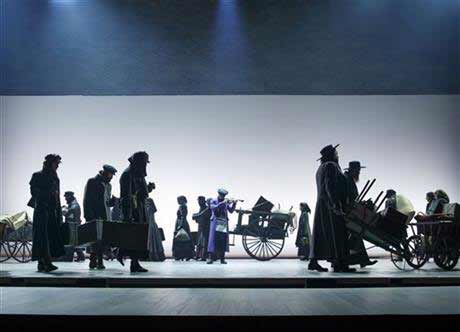
By Mark Kennedy
NEW YORK – The Tevye who first emerges in the latest revival of “Fiddler on the Roof” is wearing a modern winter jacket and reads the opening lines tentatively, as if from a history book. Then he strips off the jacket and melts into 1905.
It’s a simple and elegant way to connect the past with the present and the first sign that you are in thoughtful hands. The “Fiddler” that opened Sunday at the Broadway Theatre under the leadership of director Bartlett Sher is vibrant and brilliant and heartfelt.
Over at Lincoln Center, Sher and his team this past spring breathed life into “The King and I” and lightening has struck twice here. They’ve made one of the last great musicals of Broadway’s Golden Age urgent and profound.
Set in rural, pre-Revolutionary Russia, the tale of Tevye and fellow Russian Jews being forced to flee is a universal one. But audiences at this revival won’t be able to miss the parallels to real life as Europe witnesses the greatest movement of refugees since World War II.
Still, it’s Tevye’s battles with tradition that is at the center of this classic Jerry Bock, Sheldon Harnick and Joseph Stein musical, with a list of songs that are pure bliss. And the musical usually rises or falls on the performance of its leading man.
This time, it’s Danny Burstein and he is superb, just the right amount of humor and anger and endless love. Burstein is a playful and human Tevye. He sometime cheekily addresses the audience, as if to enlist our support in his various conversations with God.
His three rebellious daughters are also sublime, from Alexandra Silber’s soulful Tzeitel to a luminous, heartbreaking Samantha Massell and a bookish-revolutionary Melanie Moore. They are a joy to hear and watch as they weigh their new romances with the heartbreak they are making their father endure.
Brilliant touches are everywhere. When Tevye says goodbye to Hodel, he wraps his scarf around her neck, a gesture echoed by Golde doing the same a few scenes later with Chava. When Motel sings about God making the Red Sea part, he dunks his hands into a pail of real water.
These are small things but they add up to that taken-care-of feeling you get at a great restaurant, of a team that has thought of everything. This is a show that has somersaulting dancers and real Sabbath candles, but never loses its focus.
There is a welcome naturalism to this “Fiddler.” Donald Holder’s lighting design conjures pale bleakness and low winter sun. But naturalism goes out the window for “Tevye’s Dream,” when a thrilling sort of New Orleans Mardi Gras parade madness takes hold. Dancers in masks and elongated fingers — some on stilts — add a surreal, humorous touch and fill the massive stage.
It all adds up to a remarkable achievement. From the first moment to the profound last, this “Fiddler on the Roof” is a triumph. The show is the star.
To read the full review, please click here.
"A REASON FOR CELEBRATION! Entirely Fresh, Funny & Gorgeous."
- New York Magazine
Anatevka Regains Some Bite in the New Fiddler
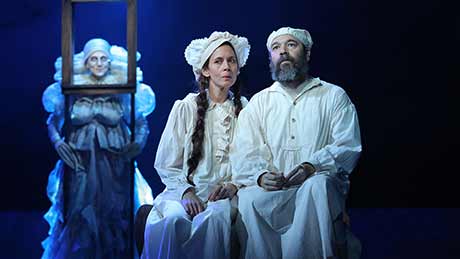
By Jesse Green
It’s hard enough to revive a musical that didn’t work the first time. But it may be an even harder job to revive a musical that works quite well, has already returned repeatedly and successfully, and is much beloved as is, or was. That last sentence is basically Bartlett Sher’s calling card — he directed the recent Tony-winning revivals of South Pacific and The King and I — but it is even more so the dilemma he faced in staging the new Fiddler on the Roof. That he has made of it a show that feels entirely fresh and specifically engaged in the world of 2015, without wasting the gift of its innate beauty and huge emotional power, is another reason for celebration.
It is a look at the forces, both internal and external, that force people to leave what they love. In order for us to freshly engage with those people, Sher has done two important things. One is the hiring of the Israeli choreographer Hofesh Shechter to rework most of the dances. These are more authentic and thus more unfamiliar, with an aggressive, almost coarse manner and a different vocabulary of rotated arms and upraised hands. The famous Bottle Dance is rethought, with bravura additions. Robbins fans needn’t worry; he’s still fully baked into the show.
What feels like a departure — and this is Sher’s second major adjustment — is the acting style throughout. It starts with the hiring of Burstein and, as Golde, Jessica Hecht. Burstein makes of Tevye’s waffling, weasel qualities something more than just amusing patter; they are character faults masquerading as philosophy. The growing inadequacy of that philosophy in dealing with the blows the show rains down on him makes this Tevye perhaps a more tragic figure than usual — a reading Burstein is fully able to sustain. And Hecht is just about as unhoneyed as a Golde can be without turning Fiddler into The Real Housewives of Anatevka; she is our reproach for enjoying the dreams and evasions of her shlimazel of a husband. The rest of the cast is likewise working in crossover mode, with sufficient panache to sell the material and sufficient seriousness to make it worth the selling. Sher sets the stakes so high right from the beginning that Alexandra Silber, as Tevye’s oldest daughter, Tzeitel, is in tears before the start of “Matchmaker, Matchmaker.” Similarly, Alix Korey makes a particularly hilarious, and heartbreaking, Yente.
By the time Sher closes his frame you may well be (as I was) a mess of tears. There is emotion everywhere you look and listen in this Fiddler. Not that it isn’t fresh, funny and gorgeous. But what Sher and Shechter and the rest of the creative team have focused on is the human story of separation: of man from homeland no less than of child from parent. If that’s kitsch, I’ll eat my yarmulke.
To read the full review, please click here.
"BEAUTIFUL & STIRRING."
- The Hollywood Reporter
'Fiddler on the Roof': Theater Review
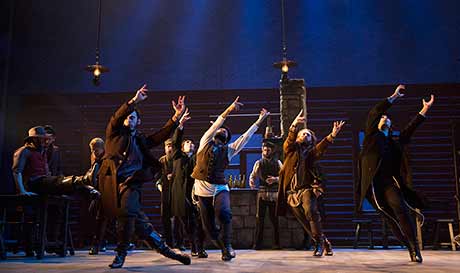
By David Rooney
Director Bartlett Sher’s reputation for enriching the dramatic texture of great American musicals is further cemented by this stirring revival starring Danny Burstein.
The eternal theme of forced immigration acquires powerful cumulative pathos in Bartlett Sher’s beautiful revival of Fiddler on the Roof, led by a performance of aching humanity from Danny Burstein as the dairyman Tevye. The musical’s rousing prologue stresses the value of “Tradition,” and this staging honors that imperative while at the same time providing a robust connective thread between the story and our world a century later.
Burstein does larger-than-life by subtler means, which is nowhere more evident than in his full command of the character in “If I Were a Rich Man.” The faintest trace of the Borscht Belt in his humor and his wryly self-dramatizing dialogues with God also provides a further bridge in the director’s vision of the story as one that still has relevance to contemporary American life. The unforced warmth of his big-hearted performance could heat the whole theater through winter.
The other key factor fueling this production’s galvanizing life force and vivid sense of Jewish identity is also its most radical departure from the original: the explosive, loose-limbed movement of Israeli modern dance choreographer Hofesh Schecter.
The dancing is simply extraordinary. This has the sensation of raw, almost primitive spontaneity. The fingers are splayed, always reaching, while the upper limbs are flung about in strong movement both exultant and earthbound. It’s dance as pure, instinctual expression of both the individual and the collective.
Working with his regular design team, Michael Yeargan (sets), Catherine Zuber (costumes) and Donald Holder (lighting), Sher has crafted a production that is cleverly rooted in folklore and fairy tales, with elements of Marc Chagall. There’s something magical about the place, as if it’s being conjured in the memories of villagers long departed or from the stories they passed down.
The revival owes much of its emotional heft to impeccable casting. Burstein’s naturally jovial manner is well matched with the invaluable Jessica Hecht’s sober take on Tevye’s careworn wife Golde.
The daughters are lovely, as are their voices, first heard when Tzeitel, Chava and Hodel (Samantha Massell) sing the yearning “Matchmaker, Matchmaker.” And Massell does a gorgeous job on “Far From the Home I Love.” Their suitors are equally charming: Ben Rappaport as Perchik; Nick Rehberger as Fyedka; and Kantor’s Motel is particularly good, all nervous, gangly timidity until he suddenly becomes a man while standing up to Tevye, that discovery gushing forth from him in “Miracle of Miracles.”
The duality of humor and horror is essential to Fiddler, and this superb production captures that balance with enormous soulfulness, its juxtaposition of oppression with spiritual resilience echoed in a final eruption of wild dancing after the curtain call. The show also closes the Broadway year on a magnificent note. Regrettably, my annual top New York theater list was published before seeing this revival, so consider it an early entry for the best of 2016.
To read the full review, please click here.






